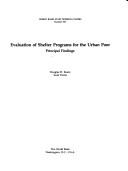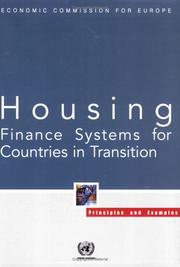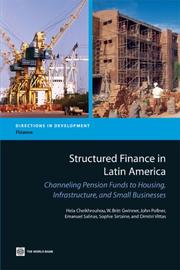| Listing 1 - 10 of 22 | << page >> |
Sort by
|
Book
ISBN: 9781138950580 9781315668666 9781317361770 9781317361787 9781138092907 Year: 2016 Publisher: London Routledge, Taylor & Francis Group
Abstract | Keywords | Export | Availability | Bookmark
 Loading...
Loading...Choose an application
- Reference Manager
- EndNote
- RefWorks (Direct export to RefWorks)
Due to the financialization of housing in today’s market, housing risks are increasingly becoming financial risks. Financialization refers to the increasing dominance of financial actors, markets, practices, measurements and narratives. It also refers to the resulting structural transformation of economies, firms, states and households. This book asserts the centrality of housing to the contemporary capitalist political economy and places housing at the centre of the financialization debate. A global wall of money is looking for High-Quality Collateral (HQC) investments, and housing is one of the few asset classes considered HQC. This explains why housing is increasingly becoming financialized, but it does not explain its timing, politics and geography. Presenting a diverse range of case studies from the US, the UK, the Netherlands, Germany, Italy and Spain, the chapters in this book include coverage of the role of the state as the driver of financialization processes, and the part played by local and national histories and institutions. This cutting edge volume will pave the way for future research in the area. Where housing used to be something "local" or "national", the two-way coupling of housing to finance has been one crucial element in the recent crisis. It is time to reconsider the financialization of both homeownership and social housing. This book will be of interest to those who study international economics, economic geography and financialization.
Housing --- Home finance --- Housing finance --- Finance. --- Sociology of environment --- Land. Real estate --- Economic geography --- real estate --- housing [concept] --- Finance --- Economic aspects.
Book
ISBN: 9781788211017 1788211014 1788212355 9781788212359 1788211006 9781788211000 9781788210997 1788210999 Year: 2019 Publisher: Newcastle upon Tyne Agenda Publishing
Abstract | Keywords | Export | Availability | Bookmark
 Loading...
Loading...Choose an application
- Reference Manager
- EndNote
- RefWorks (Direct export to RefWorks)
The US subprime mortgage crisis, by nearly causing the collapse of the global financial system during the 2007-08 financial crisis, clearly revealed that household debt management is critical to the stability of the international economy. The configuration of mortgage finance systems of European economies, from the UK to Sweden to Spain, have profound effects on national macroeconomic and political outcomes.
In this book, Gregory Fuller reveals how national housing systems diverge in terms of their commodification and financialization: mortgages are far more common in some systems than others; some encourage families to treat housing as a tradeable asset while others do not; and certain states provide extensive social housing programmes while others offer virtually none. These differences are shown to have an impact on households' economic precarity, macroeconomic volatility, and ultimately on their political preferences. Drawing on these comparisons, Fuller offers a number of policy suggestions intended to weaken the links between housing, economic instability, and inequality.
Housing --- Mortgages --- Finance, Public --- Cameralistics --- Public finance --- Public finances --- Currency question --- Hypothecation --- Real obligations --- Securities --- Security (Law) --- Conveyancing --- Liens --- Priorities of claims and liens --- Home finance --- Housing finance --- Finance --- Law and legislation --- E-books --- Finance. --- Mortgages. --- Finance, Public.

ISBN: 0821301144 Year: 1982 Publisher: Washington, D.C.
Abstract | Keywords | Export | Availability | Bookmark
 Loading...
Loading...Choose an application
- Reference Manager
- EndNote
- RefWorks (Direct export to RefWorks)
Zonder onderwerpscode --- Housing policy --- Housing --- Low-income housing --- Poor --- Inclusionary housing programs --- Home finance --- Housing finance --- Housing and state --- State and housing --- City planning --- Social policy --- Finance --- Government policy
Book
ISBN: 9211310946 Year: 1990
Abstract | Keywords | Export | Availability | Bookmark
 Loading...
Loading...Choose an application
- Reference Manager
- EndNote
- RefWorks (Direct export to RefWorks)
Housing --- Housing policy --- Logement --- Finance --- Finances --- Politique gouvernementale --- -Housing policy --- Housing and state --- State and housing --- City planning --- Social policy --- Affordable housing --- Homes --- Houses --- Housing needs --- Residences --- Slum clearance --- Urban housing --- Dwellings --- Human settlements --- Government policy --- Social aspects --- Home finance --- Housing finance
Book
ISBN: 3642422632 354077856X 9786613080141 3540778578 1283080141 Year: 2011 Publisher: Heidelberg : Springer,
Abstract | Keywords | Export | Availability | Bookmark
 Loading...
Loading...Choose an application
- Reference Manager
- EndNote
- RefWorks (Direct export to RefWorks)
The growth of urban areas and population in middle and low income countries is a continuing trend. Urbanization expands as rural to urban migration offers better income opportunities in cities. This trend is both a source of development opportunities and challenges for the housing sector. On the one hand, housing is a large and growing market, and on the other, massive slums confirm the poor housing conditions in many developing countries. These adverse conditions mirror inadequate housing policies, inefficient or absent property registration, as well as limits to access to housing finance. Provision of affordable housing is therefore an important topic in the fight against poverty. This book focuses on solutions that improve the enabling environment for the poor in accessing housing finance. It explores how to develop and integrate housing finance into a sustainable financial system for developing countries and offers ways in which low-income families can obtain better access to housing finance. This book provides a conceptual framework for housing finance development and addresses practical solutions in the provision of housing finance and compares different approaches. The global financial crisis which originated in the US sub-prime housing market has not altered the underlying reality of global housing finance: the majority of people in developing countries still do not have access to formal housing finance. Nor has it answered the biggest question: how can they be served in a sustainable way? Connecting this unserved group to appropriate housing finance products through robust financial systems must remain a top policy priority if these nations are to enjoy long term, broad-based economic growth. It is also a great opportunity for new and existing housing finance providers. DAVID PORTEOUS, Director, Bankable Frontier Associates Where property in the form of private homes is secure, people can focus on work rather than protecting their property. One of the major effects of the property rights reform driven by Hernando de Soto in Peru put more children into school. Why? Adults spent less time safeguarding their property and could search for and find better jobs. This enabled them to send their children to school. Houses are also important for those who start up businesses. The most practical source of finance beyond help from family and friends tends to be a mortgage on property. For a mortgage market to develop, banks have to be able to foreclose on property of those who cannot pay back. The obvious attractions of housing policy as a plank of social policy can also lead to policies that backfire, as the recent example of the United States shows. Housing finance is a major component of the fight against poverty. For property to yield all its benefits, institutional reforms are required – chief among them secure property rights for owners and enforceable creditor rights for financiers. Sensible regulations for zoning and construction also help. However, political pressure on banks to ignore the credit risk of home ownership or to cease foreclosures when things go wrong risks undermining sustainable housing finance. MICHAEL KLEIN, Consultant, Former Chief Economist International Finance Corporation (IFC).
Housing -- Developing countries -- Finance. --- Housing policy -- Developing countries. --- Housing --- Low-income housing --- Poor --- Business & Economics --- Economic Theory --- Real Estate, Housing & Land Use --- Finance --- Finance. --- Home finance --- Housing finance --- Macroeconomics. --- Development economics. --- Economics. --- Development Economics. --- Finance, general. --- Macroeconomics/Monetary Economics//Financial Economics. --- Economics --- Funding --- Funds --- Currency question --- Economic development
Book
ISBN: 1616683953 1617283436 9781617283437 9781616683955 Year: 2010 Publisher: New York
Abstract | Keywords | Export | Availability | Bookmark
 Loading...
Loading...Choose an application
- Reference Manager
- EndNote
- RefWorks (Direct export to RefWorks)
Real estate investment. --- Housing --- Mortgage loans. --- Finance. --- Home loans --- Mortgage lending --- Real estate loans --- Home finance --- Housing finance --- Investment in real estate --- Real property investment --- Loans --- Secondary mortgage market --- Investments --- Land speculation --- Real estate business --- Real estate investment --- Mortgage loans --- Finance --- E-books

ISBN: 1852787546 Year: 1997 Publisher: Cheltenham Elgar
Abstract | Keywords | Export | Availability | Bookmark
 Loading...
Loading...Choose an application
- Reference Manager
- EndNote
- RefWorks (Direct export to RefWorks)
332.2 --- 332.2 Grondbezit. Onroerende goederen --(economische structuur) --- Grondbezit. Onroerende goederen --(economische structuur) --- Housing --- Supply and demand --- Affordable housing --- Homes --- Houses --- Housing needs --- Residences --- Slum clearance --- Urban housing --- City planning --- Dwellings --- Human settlements --- Demand and supply --- Industrial production --- Law of supply and demand --- Economics --- Competition --- Exchange --- Overproduction --- Prices --- Value --- Home finance --- Housing finance --- Finance --- Social aspects
Book
ISBN: 9780230230811 9780230230804 0230230814 0230230806 9786612532269 0230280447 128253226X Year: 2009 Publisher: Basingstoke Palgrave Macmillan
Abstract | Keywords | Export | Availability | Bookmark
 Loading...
Loading...Choose an application
- Reference Manager
- EndNote
- RefWorks (Direct export to RefWorks)
Housing policy. --- Housing --- Financial crises. --- Logement --- Crises financières --- Finance. --- Prices. --- Politique gouvernementale --- Finances --- 728.1 --- Crashes, Financial --- Crises, Financial --- Financial crashes --- Financial panics --- Panics (Finance) --- Stock exchange crashes --- Stock market panics --- Crises --- Business cycles --- Dwellings --- Home prices --- House prices --- Housing prices --- Residential real estate --- Home finance --- Housing finance --- Housing and state --- State and housing --- City planning --- Social policy --- Woonhuizen. Woningbouw --- Prices --- Government policy --- Financial crises --- Finance --- Housing policy --- Crises financières

ISBN: 9211169232 1423727223 9789211169232 Year: 2005 Publisher: New York ; Geneva : United Nations,
Abstract | Keywords | Export | Availability | Bookmark
 Loading...
Loading...Choose an application
- Reference Manager
- EndNote
- RefWorks (Direct export to RefWorks)
Housing --- Housing policy --- Mortgage loans --- Finance --- Government policy --- Finance&delete& --- Transition economies --- E-books --- Housing policy. --- Mortgage loans. --- Business & Economics --- Real Estate, Housing & Land Use --- Home loans --- Mortgage lending --- Real estate loans --- Loans --- Secondary mortgage market --- Affordable housing --- Homes --- Houses --- Housing needs --- Residences --- Slum clearance --- Urban housing --- City planning --- Dwellings --- Human settlements --- Housing and state --- State and housing --- Social policy --- Home finance --- Housing finance --- Finance. --- Government policy. --- Social aspects --- Housing - Finance --- Housing - Finance - Government policy

ISBN: 0821371398 9786610940325 1280940328 0821371401 Year: 2007 Publisher: Washington, D.C. : World Bank,
Abstract | Keywords | Export | Availability | Bookmark
 Loading...
Loading...Choose an application
- Reference Manager
- EndNote
- RefWorks (Direct export to RefWorks)
Structured Finance in Latin America explores how structured finance mechanisms can channel pension savings to support projects in underserved sectors, deepen capital markets, and contribute to investment and economic growth. Private pension funds have been accumulating assets rapidly in the wake of pension system reforms in many Latin American countries. Strict investment regulations to protect workers' savings have limited their investment in highly creditworthy domestic securities, yet pension fund demand for new securities has outstripped issuance of eligible traditional corporate debt
Pension trusts. --- Pension trusts --- Housing --- Infrastructure (Economics) --- Small business --- Business & Economics --- Labor & Workers' Economics --- Investments --- Finance --- Finance. --- Businesses, Small --- Medium-sized business --- Micro-businesses --- Microbusinesses --- Microenterprises --- Small and medium-sized business --- Small and medium-sized enterprises --- Small businesses --- SMEs (Small business) --- Capital, Social (Economics) --- Economic infrastructure --- Social capital (Economics) --- Social infrastructure --- Social overhead capital --- Home finance --- Housing finance --- Employee pension trusts --- Pension funds --- Pension plans --- Business --- Business enterprises --- Industries --- Economic development --- Human settlements --- Public goods --- Public works --- Capital --- Trusts and trustees --- Size
| Listing 1 - 10 of 22 | << page >> |
Sort by
|

 Search
Search Feedback
Feedback About UniCat
About UniCat  Help
Help News
News